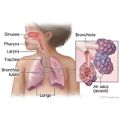Our Health Library information does not replace the advice of a doctor. Please be advised that this information is made available to assist our patients to learn more about their health. Our providers may not see and/or treat all topics found herein.
Topic Contents
Croup
Condition Basics
What is croup?
Croup is a common respiratory problem in young children. It tends to occur in the fall and winter. Its main symptom is a harsh, barking cough. Croup causes swelling and narrowing in the voice box, windpipe, and breathing tubes that lead to the lungs. This can make it hard for your child to breathe.
An attack of croup can be scary, but it is rarely serious. Children usually get better in several days with rest and care at home.
What causes it?
Croup usually occurs a few days after the start of a cold and is usually caused by the same viruses that cause the common cold. Croup is contagious. The germs that cause it can be passed from one person to another through coughing and sneezing and through close contact. Regular hand-washing and limiting contact with others can help prevent the spread of croup.
As children grow older and their lungs and windpipes mature, they are less likely to get croup. Staying up to date on COVID-19 vaccines and getting a flu vaccine each year may help your child fight off some of the viruses that can lead to croup.
What are the symptoms?
Symptoms of croup are caused by narrowed airways. They may include:
- A barking cough. The cough is often compared to the sound of a barking seal. You'll know it when you hear it.
- A raspy, hoarse voice.
- A harsh, crowing noise when breathing in. Sometimes children breathe fast and need to sit up to breathe better.
Symptoms of croup often improve during the day and get worse at night. Sometimes children have croup attacks that wake them up in the middle of the night for a couple of nights in a row. Unless the illness is severe, a child with croup is usually alert and active. The child's temperature is usually normal or only slightly higher than normal.
How is it diagnosed?
Your doctor will probably be able to tell whether your child has croup based on your child's symptoms and a physical exam. The doctor may be able to identify the barking cough of croup over the phone.
The doctor may place a small clip called a pulse oximeter on your child's finger, toe, or earlobe to make sure that enough oxygen is reaching the blood.
How is croup treated?
Even though your child's coughing and troubled breathing can be frightening, home treatment usually eases the symptoms.
The illness usually improves in 2 to 5 days.
When home treatment isn't enough, medicines such as glucocorticoids or epinephrine may be used to decrease airway swelling. These are usually given in a doctor's office or an emergency room. In rare cases, your child may need to stay in the hospital to get extra oxygen or other treatment.
How can you care for your child?
- Try to stay calm during an attack, and soothe your child. Your child's crying can make the swelling in the windpipe worse and make it even harder to breathe.
- Give your child a hug or offer a favorite toy.
- If symptoms improve with these methods, put your child back in bed. If the symptoms happen during the middle of the night, it is a good idea to sleep in or near your child's room until morning.
- Be sure to keep your child well hydrated. Offer water, flavored ice pops (such as Popsicles), or crushed-ice drinks several times each hour.
- Do not let anyone smoke around your child or in the house.
- Do not give your child over-the-counter cough or cold medicines. They don't help with croup, and they may not be safe for young children.
Related Information
Credits
Current as of: October 24, 2024
Author: Ignite Healthwise, LLC Staff
Clinical Review Board
All Ignite Healthwise, LLC education is reviewed by a team that includes physicians, nurses, advanced practitioners, registered dieticians, and other healthcare professionals.
Current as of: October 24, 2024
Author: Ignite Healthwise, LLC Staff
Clinical Review Board
All Ignite Healthwise, LLC education is reviewed by a team that includes physicians, nurses, advanced practitioners, registered dieticians, and other healthcare professionals.
This information does not replace the advice of a doctor. Ignite Healthwise, LLC disclaims any warranty or liability for your use of this information. Your use of this information means that you agree to the Terms of Use and Privacy Policy. Learn how we develop our content.
To learn more about Ignite Healthwise, LLC, visit webmdignite.com.
© 2024-2025 Ignite Healthwise, LLC.





